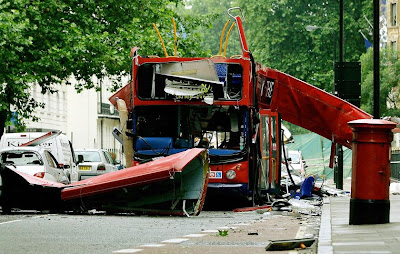During my year of deployment in support of Operation Iraqi Freedom, it sometimes seemed like the most dramatic news was happening outside the borders of Iraq. A quick mental scan of headlines in 2005 reminds me that we watched Terri Schiavo's slow death, Michael Jackson's trial, and Hurricane Katrina's wrath from the distance of several continents away. Filtered through CNN, Stars and Stripes and our phone calls with family back home, it was like watching bizarre and troubling theater through high-powered binoculars. Here we were, supposedly in the hot center of conflict (which Baghdad certainly was), but it felt like the rest of the world was melting into a puddle of consecutive tragedy.
On July 7, all eyes in the Army task force headquarters where I worked were glued to the TV screens as smoke rose out of a London Underground station. I'm sure a few of us were convinced we were watching another 9/11 unfold--it even had its own catchy name: "7/7." It fueled us with equal parts despair and determination--a sinking feeling that our work would never be done in the fight against terrorism, but also fresh resolve to keep plugging away at the fight. That night, I sat on the edge of my cot and wrote the following journal entry.
July 7, 2005: Sometime in the afternoon, midway between the chatter and clatter of our day here in Baghdad, it happens. The regular TV news broadcasts stop mid-syllable and start showing pictures of gray London streets, hazy with pending rain and the flat cold light of grim “terror,” as the new TV label calls it. I stare at the screen as the news breaks. Explosions on the subway. A double-decker bus peeled open by a blast. The first reports, delivered with dramatic hysteria by the Fox News anchors, tell us there were six simultaneous bombs and at least 90 dead, hundreds wounded. The numbers will later be downgraded to four bombs and 52 dead, but in those first minutes, there is a very real question as to how large this attack will turn out to be and the newsman’s panting perspiration is to be forgiven.
I walk over
to Sergeant First Class B. and Specialist R. on their side of the cubicle where they are putting the final touches on the latest edition of The Marne
Express. “You guys watching this?”
“No, what?”
“Terrorist
attacks in London.”
“No shit?”
“At least
90 dead. Doesn’t look good. Not good at all.”
I go back
to the TV, the demands of our own pending press releases temporarily set aside. The live video coming from London is,
frankly, undramatic: an aerial shot of the entrance to one of the
subways, static with fire trucks and ambulances; a stationary view down a
now-deserted street in another part of the city, police caution tape fluttering
in front of the camera as the breeze catches it, and it takes many minutes for
me to realize we’re looking at half of a double-decker bus—no bodies in sight,
just bent red metal and exposed seats. There
are interviews with survivors who have emerged, blinking and soot-covered, from
the Underground station. But even these
are banal. There is no hysteria, no
garish rivulets of blood, very little sobbing or wild, darting eyes. Even in shock, the Brits keep their
cool-as-yesterday’s-tea composure. This,
the TV later tells us, is “the worst attack on Britain since World War
Two.” When Tony Blair steps up to
the microphone, there is hardly a tremble in his voice. If anything, his upper lip has stiffened with
more resolve.
There is
speculation about how this will only serve to make England more determined to
join the fight here in Iraq and Afghanistan.
The terrorists, whoever they are in this instance, thought they could
frighten Britain into withdrawing its troops from around Samarra. However, it seems their objective backfired
and now there is nothing but contempt and condemnation in the voices of leaders
from around the world (including Iran) as they echo G. W. Bush’s rhetoric at the
G-8 conference in Scotland: “We will not give in to terrorism.” For this one instant on this sad, gloomy day,
it’s possible to see Churchill picking his way among the bombed-out ruins of
the Blitz, clamping his teeth on his cigar and growling, “Never give in--never, never, never, never.”
The London
attacks simultaneously piss me off and deepen my sorrow at the fact that we’ve
plunged ourselves into what feels like an unwinnable war. We can kill terrorists, we can “detain” them
by the thousands, we can strip them of their weapons caches, but it seems like
the more we do to “win” the war on terrorism, the more we fuel the religious
and political fire that burns in the Mideast breast. When one terrorist falls, there will always
be two more to rise up and take his place.
It all goes back to the Whack-a-Mole theory I’ve held from the start:
you can hit one guy with a rubber mallet in one place, but then another pops up
somewhere else, and while you’re whacking that guy, another one has popped up
elsewhere. The only difference is, in
the carnival Whack-a-Mole, the game’s over when you run out of quarters.
















Great post, David. Chilling…
ReplyDelete